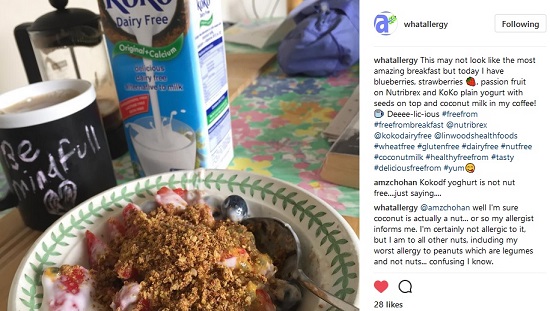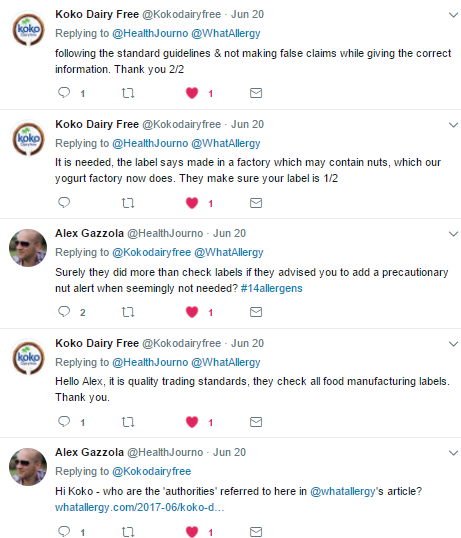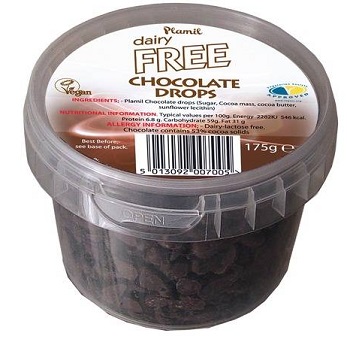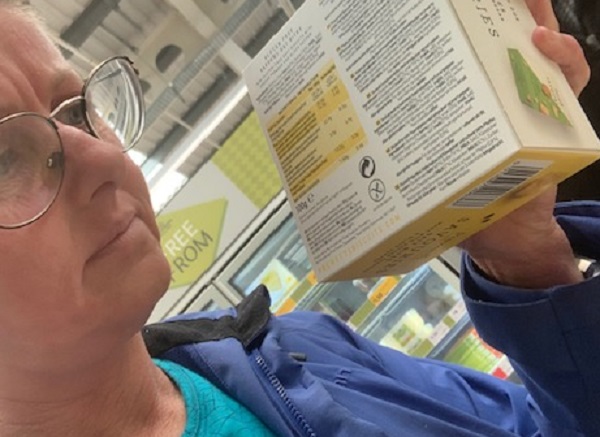It would seem that KoKo Dairy free have recently changed their packaging due to circumstances at their factory. I was made aware of this by someone on Instagram who was very quick to point out that I was wrong to claim my breakfast was #nutfree

At first I was confused (I was petrified… sorry, couldn’t pass up a song reference). Coconut is not a nut… but it soon became clear that this person was in the know and quite delighted to put me straight. I felt foolish and little downhearted. Was I losing yet another nut free product from my staple supermarket basket?
I contacted KoKo and I think the news is good. They are duty bound to update labelling if circumstances change at their factory but I do wish the packaging could contain more detailed explanations, without all this emailing to check. But hey ho. It’s easy to contact a company these days.
This what they said,
“Thank you for your email and I hope I can clarify our change in labelling to you to give you some reassurance when consuming our Koko Diary Free yogurts.
No, none of our products contain nuts. However, we have recently discovered that the factory that makes our yogurts has started to make a yogurt product where a sealed plastic container is added to the top of a yogurt pot which contains Muesli for consumers to tip into their yogurt and this muesli has some nuts included in it. The Muesli is delivered in the little sealed pots which are shrink-wrapped onto the yogurt pots. Their contents are not exposed or open at all.
Initially we were not concerned as this is a managed risk but we decided to take advice and whilst the risk is infinitesimally small the authorities recommended that we put a warning on the packaging. All our yogurts are made in the same place, and so this applies to all our yogurts.
The risk of nuts entering the product is extremely small. The Muesli is delivered in the little sealed pots which are shrink-wrapped onto the yogurt pots. Their contents are not exposed or open. Initially we were not concerned as this is a managed risk but we decided to take advice and whilst the risk is very small the authorities recommended that we put a warning on the packaging.
As we do not own the factory so we cannot prevent them from doing other work. They appreciate the situation but believe that all the systems are in place to make sure that there can be no contamination risk so we are left in a dilemma. We fully appreciate that if they were making a hazelnut yogurt or something where nuts were added to a yogurt we would not be able to continue making our product but that is not the case. They only make plain or fruited yogurts and then there is one product they now make that has this sealed container added.
Our milk and spread are made in a separate factory with no potential of cross contamination.
I hope this is sufficient and if I can help further please do let me know and your disappointment isn’t too great?”
I will be asking them about my dairy allergy and whether this could pose a risk… since it isn’t clear what other yogurt products are made at the factory but I feel this is very good news.
The product containing nuts is in a sealed container and KoKo do not have any products containing nuts, so I would hazard my own judgement that this product is still pretty safe for those with a nut allergy.
I eat food prepared in kitchens with nuts are kept in sealed containers, so I am pretty sure these products will remain safe.
So just in case you see the nut warning or hear some bad press… KoKo have not deserted us.
The milk and spread is till completely freefrom and the yogurts, do not pose any risk of cross contamination in my view.
What do you think? Had you noticed the nut warning on the new packaging? Will you still eat KoKo dairy free products?
I’ve been eating them in blissful ignorance for a while anyway and had no adverse reactions. Any thoughts?
Further discussions on Twitter
Head over to What Allergy on Twitter to see more discussion on this. Alex Gazolla of Allergy Insight asked why the precautionary nut label was necessary…














Leave a Reply